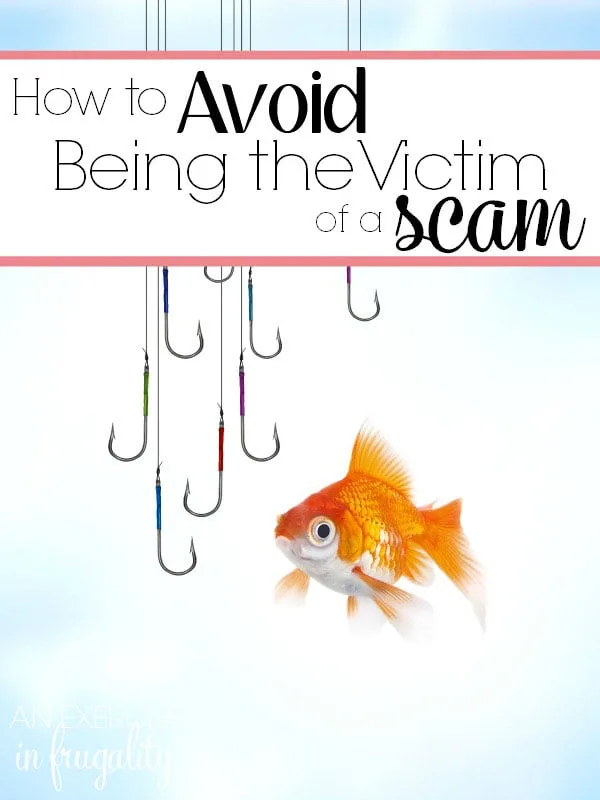Scams are EVERYWHERE these days. Everything from online scams, email scams, Craigslist scams, even IRS scams. So how does a person avoid the rampant scams that are everywhere we turn? Today I wanted to share some tips for protecting yourself from predators trying to rip you off to make a buck.

I can remember many times getting a frantic phone call from my mom. She would say someone from some random law office called for me and they said they had a matter in their office that needs my immediate attention. Inevitably it would turn out to be a scam. No matter how many times I told her these calls were fake, it still sent her into a panic.
I still to this day get calls and emails claiming I have debt with the IRS (I don’t) or that I won some sweepstakes I entered (I didn’t) or, my personal favorite, that my bank needs me to reset my password (from a bank where I have never owned an account).
If you’re not careful, you can get taken advantage of. Sometimes the scams are so good that even the savviest of consumers falls victim to a swindle. It’s important to be vigilant and protect yourself.
It’s easier to avoid the scam than it is to try to get justice and get your money back.

Tips for Avoiding Scams
Have a healthy dose of skepticism
The old adage “too good to be true” applies here. If something seems amiss-there’s a good chance it is. Don’t be afraid to ask questions, don’t be in too much of a rush to do a little research. Often times our willingness to trust people is what gets us in trouble.
If a Nigerian prince emails you to tell you that you have inherited $50 million, chances are good that you should be very skeptical. I always try to see the good in people, however you have to be smart. Make sure you use your critical thinking skills and do a little investigating.
Never trust an email link
Let’s say for example you get an email from Paypal. They tell you in the email there’s a problem in your account and you need to log in to fix something. Do you click the link in the email, pop over and change the info?
NO.
Even if you are 100% sure that the email came from who it says, always open a new browser window or tab and manually type in the URL to the page you need. That link could easily go to a fake page that could steal your information or install malware (computer virus).
Your caller ID lies
Unfortunately the latest scams involve “spoofing” caller ID. The caller can call you from anywhere on the planet using a number that could be from somewhere else, it can even be a number right from your own contacts list!
If you get a call from someone and you’re not sure that’s really where they are calling from (like for example if they say they are calling from the IRS or from your bank), tell them you’ll call them right back, and call a known, published number to see if they are legit.
NEVER give out your information to someone who randomly calls you, no matter WHO they say they are.
Know the truth
This is where those street smarts come in. No bank will ever call you and ask you for your ATM pin. Paypal will never ask you for your login information. The police department will never call you and demand money. Know what is and is not part of a company’s typical practice. A legitimate issue will either involve the person on the other end already having this information OR they will be ok with you verifying their information with their employer.
If the caller or emailer claims to be with your bank, hang up, call the number on the back of your ATM card and ask them if they were trying to reach you. While you’re on the phone with someone you KNOW works at the bank, ask them what kinds of information they CAN and CANNOT ask for, and this will help you figure out if future callers are legit.
Pay attention to payment methods
In addition to knowing the kind of information legit businesses will and won’t ask for, know that most legit companies will not demand certain payment methods. For example, the IRS is never going to tell you that you must pay by Western Union. A bank will never demand payment with a prepaid reloadable card.
These methods are often harder to trace and don’t have the same fraud protection built in as a credit or debit card.
Don’t do anyone any favors
Everything from cosigning a loan for a friend/cousin/nephew to cashing a check for someone and wiring the money back (minus a handsome fee for yourself, of course) falls into this category and they are all terrible ideas. Loaning money to family is a terrible idea, cosigning is even worse because someone with bad enough credit to require a cosigner is going to be a prime target for predatory lending. And the whole wire transfer scheme is dangerous.
Funds for the deposited check will clear LONG before a fraudulent check can be detected, leaving you on the hook for the money that isn’t there.
Always do your computer updates
This may seem like an odd one, but it’s just as important if not more so than the others. I wouldn’t be the wife of an IT guy if I didn’t mention data security! Think about ALL the personal information on your computer. Now imagine it being gone. Not just gone, but being used against you. Your social security number, bank passwords, account numbers, everything.
By keeping your computer updated, you are allowing the operating system time to patch itself and apply any new protections against known hacking attempts. It might be a pain (I am guilty of it too) but it can save you in the long run.
My poor husband gets so frustrated with me because I hate doing updates and rebooting, but he’s an IT manager and he knows all the data security protocols and all the dangers of hacking so he stresses the importance, and I try to listen!
Familiarize yourself with the current “trending” scams. Look for the latest scam alerts and then you’ll be able to be on the lookout for it. If you ever come across a scam be sure to report it to the FTC.

Kristopher lee
Friday 4th of May 2018
Great article. My wife almost fell victim to a job offer scam. They offered her $80,000 a year with no interview. She was supposed to cash medical checks that were mailed to her, keep a percentage, and wire the rest to an account. They sent a real check, but we realized it was a scam. If we would have cashed it, we would have had to reimburse the bank.